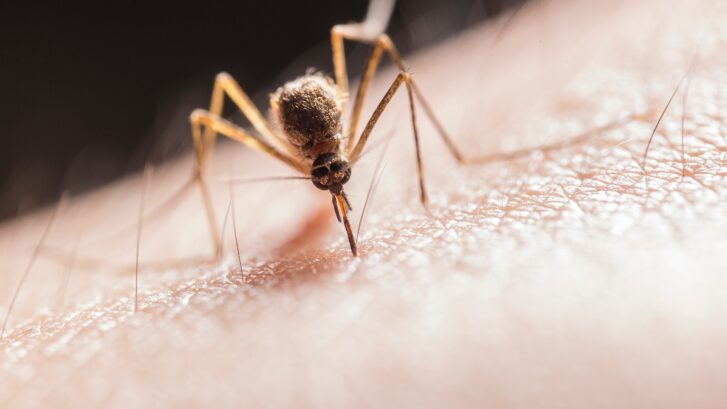Declare War on Mosquitoes This Summer
For the past year-and-a-half, we’ve been at war against an unseen but deadly coronavirus. But our family practice doctors in Jupiter, Florida, want to remind you of another war humanity has been fighting for millennia: the one against mosquitoes.
The Centers for Disease Control and Prevention (CDC) says the pesky mosquitoes are more than just a summer annoyance. It’s one of the world’s most deadly animals.
The toll from mosquitoes
“Spreading diseases such as malaria, dengue, West Nile, yellow fever, Zika, chikungunya, and lymphatic filariasis, the mosquito kills more people than any other creature in the world,” the agency says.
One of the most common diseases spread by mosquitoes is malaria. In 2015, it killed nearly 438,000 people around the world.
Although for most people a mosquito bite can be just an itchy annoyance, children and some people with weakened immune systems can also experience such symptoms as swollen glands, hives, and even a low-grade fever.
In rare cases, the American Academy of Allergy, Asthma, & Immunology (AAAAI) reports, mosquito bites can even trigger anaphylaxis in sensitive individuals. This is a medical emergency characterized by throat swelling, generalized hives, faintness, or wheezing.
Heading mosquitoes off this summer
The U.S. Environmental Protection Agency (EPA) says that successful mosquito management requires intervening at some point during the mosquito’s life cycle before they bite and infect a human.
The agency has partnered with the CDC to encourage all communities to participate in Integrated Pest Management (IPM). This program focuses on prevention, reduction, and elimination of conditions that lead to infestations.
While both the EPA and CDC acknowledge the need for the use of pesticides in certain circumstances, the agencies also report that a critical part of mosquito control around homes is making sure that mosquitoes don’t have a place to lay their eggs.
Therefore, it’s important to monitor standing water sources in and around the yard.
- Get rid of standing water in rain gutters, old, tires, buckets, plastic covers, toys, or any other container where mosquitos can breed.
- Old tires can collect standing water that attracts mosquitoes and leads to increased mosquito breeding, so remove or shred them.
- Empty and change the water in birdbaths, fountains, wading pools, rain barrels, and potted plant trays every three days.
- Drain temporary pools of water or fill with dirt.
- Keep swimming pool water treated and circulating.
Be diligent in searching for standing water. Even a bottle cap filled with water is enough for the female to lay her eggs in. And remember that in hot weather, mosquito larvae can hatch in as few as three days.
How to avoid bites
Preventing bites from mosquitoes this summer your first and best line of defense. Because mosquitoes are most active for a couple hours around sunrise and sunset each day, it’s best to avoid being outdoors at those times if you can.
Mosquitoes are attracted to perspiration, heat, and the carbon dioxide we exhale when we breathe heavily. That means you’re more likely to get bitten if you’re working or playing hard outdoors. They also appear to be more attracted by dark-colored clothing.
The insect repellent DEET, at 20 percent or higher strength, is effective in preventing mosquito bites. Picaridin may also repel them.
The CDC also recommends oil of lemon eucalyptus (OLE), para-menthane-diol (PMD), or 2-undecanone (methyl nonyl ketone) as effective mosquito repellents, and cautions that people using sunscreen should apply that first, let it dry, then apply mosquito repellant. For that reason, it recommends against using products containing both sunscreen and repellant.
Because different people have different requirements for insect repellant, the EPA has provided an online search tool to help you select the one that’s best for you. The tool also offers guidance on the safest and most effective ways to apply them.
Treatment
Despite your best efforts, though, mosquito bites are almost inevitable. So here are some ways to treat them.
First, look for signs of a serious reaction (anaphylaxis) in anyone who has been bitten. If the person experiences any of the following symptoms, seek immediate medical help:
- hives
- difficulty breathing
- rapid heartbeat
- dizziness, faintness, or confusion
- unusual redness of the skin (especially where the bite didn’t occur)
- swelling of the lips, eyelids, or throat
- nausea, cramps, or vomiting
Less serious bites may still be intensely painful and/or itchy. Keep in mind that scratching not only intensifies the itch, but can also lead to localized infection.
Hydrocortisone cream (.5 or 1 percent strength) or calamine lotion applied topically may reduce the pain, itching, and swelling. An over-the-counter antihistamine either taken orally or applied topically may also help with the itching.
A paste of water and aspirin or baking soda or meat tenderizer or powdered activated charcoal (not all four together) works for many people. The charcoal is the kind sold in capsules to relieve gas. Carefully open a couple capsules, add a drop or two of water and apply to the site.
Other home remedies that many swear by to protect you from mosquitoes this summer. These include applying the cut side of an onion, vinegar, hot water, lavender, or salt to the site.
If the bite is still bothering you after a couple days or appears to have become infected, let us know.

